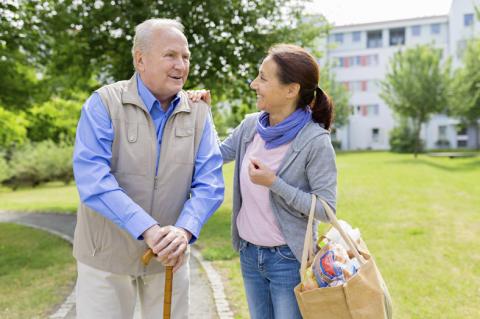Content Map Terms

Abuse and neglect in later life can affect health, happiness and safety. Older adults can experience different kinds of harm including physical, emotional, financial, sexual, spiritual, social, withholding medication or the necessities of life.
Elder abuse in any form is wrong. Neglect and self-neglect are also forms of abuse. Self-neglect happens when a senior lives in a way that puts his or her health, safety or well-being at risk. Abuse and neglect can happen from trusted caregivers or family members.
Be aware of the signs and symptoms of elder abuse and neglect:
- Fear, anxiety, depression or passiveness around a family member, friend or care provider
- Unexplained injuries
- Dehydration, poor nutrition or poor hygiene
- Improper use of medication
- Confusion about new legal documents such as a will or a new mortgage
- Sudden drop in cash flow or financial holdings
- Reluctance to talk about the situation
When someone is being abused or neglected
If you suspect elder abuse, help is available. If you or someone you know is in immediate danger dial 9-1-1 or call the emergency number listed in the front of your phone book. In non-emergency situations there are many organizations that can help. These include:
- The Seniors’ Abuse and Information Line (SAIL)
SAIL is a safe, confidential telephone service for older adults and those who care about them. To talk to someone if they feel they are being abused or mistreated, or for information about elder abuse prevention, call toll free: 1-866-437-1940 - VictimLink BC
If someone is abusing or neglecting you or someone you know, call VictimLink BC. VictimLink BC is a confidential telephone service available across BC and Yukon 24 hours a day, seven days a week. Call toll-free: 1-800-563-0808 - Assisted Living Registrar
If you believe someone is being abused or neglected in an assisted living facility, contact the Assisted Living Registrar. The registrar investigates complaints about the health and safety of assisted living residents. - Community Care Licensing Officers
Community care licensing officers investigate complaints about the health, safety or well-being of a person in care at a licensed community care facility. - Agencies responding to abuse
Designated agencies in British Columbia (regional health authorities, Providence Health Care Society, and Community Living BC) can respond to reports of abuse, neglect, and self-neglect of adults who cannot get help on their own. - Shelters and Counseling
Access to emergency shelters can be found in many communities across the province.Women who are victims of abuse or neglect and who require short-term emergency shelter and counseling can contact local transition houses in their communities.
Fact: One in five Canadians believes they know of a senior who might be experiencing some form of abuse.
What can I do?
Protect yourself, be informed and make a plan. See our article on making future decisions about health care.
Spread awareness through your friends and social media
The abuse of older adults is everyone’s business. You can talk to your friends and family to spread awareness about elder abuse and the resources available to help recognize, respond to, and prevent elder abuse from happening.
If you use social media, use the BC Centre for Elder Advocacy and Support handle @BCCEAS to show your support.
Did You Know?
Financial abuse is the most commonly reported type of elder abuse.
